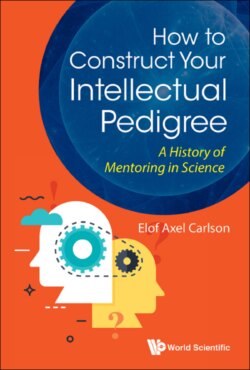Читать книгу How to Construct Your Intellectual Pedigree - Elof Axel Carlson - Страница 20
На сайте Литреса книга снята с продажи.
13Assessing Inputs into My Life
ОглавлениеI was born during the Great Depression in 1931. I had a brother born in 1929 who had a congenital heart defect that was nonoperable in those days. He was given six months to live and lived to be 45. My father was an elevator operator who left Sweden for the Merchant Marine and then settled in NY as an elevator operator. My father had a passion for reading books and our apartment was filled with books. My mother was born in Bound Brook New Jersey of immigrant Ukrainian parents who were orthodox Jews. My father was a lapsed Lutheran who was an atheist. My mother was disowned by her family. More troubling, she was schizophrenic and had been institutionalized after the failure of her first marriage which was arranged by her father. My brother and I were never given any religious affiliation and grew up as atheists. My mother’s first marriage produced my half-sister and halfbrother. I was born when my half siblings were in their late teens and on their own. Because of poverty and my mother’s paranoia, we moved a lot and I went to eight different public schools. It was not until junior high school that I bonded with Hugh F. Browne, my science teacher. He liked my work and personality so much that he asked my parents if he could adopt me, so I would have a better chance of attending college. They refused but thanked him for his concern. In high school I bonded with M. G. Cohen and read aloud to him from classical literature from my senior year in high school to my graduation from NYU. Mr. Cohen gave me the education that millionaire’s children got from private tutors in the 17th and 18th centuries. I read aloud to him because he was going blind from Leber’s optic atrophy. We began with plays of Aeschylus, Sophocles and Euripides and ended with Freud’s Civilization and its Discontents. It made me aware of the continuity of knowledge from antiquity to the present.
We were a nuclear family with no visiting relatives and no friends or acquaintances of our parents visiting our apartment. At NYU I particularly liked Charles Davis, my first Afro-American teacher and my English instructor, who encouraged me to write. I also liked Wallace Ferguson and his approach to history, so I minored in history while majoring in biology. I wrote to Muller and asked if I could be his student. I was a teaching assistant and then National Science Foundation fellow getting my PhD. Muller had enormous influence on shaping my habits as a scientist and seeing genetics in historical, social, and contemporary context. Muller’s laboratory also was a place of stimulating discussions with my fellow graduate students especially Seymour Abrahamson, Abe Schalet, Sarah Frye and Irwin Oster. I benefitted too from IU’s faculty whose courses I took in zoology and botany. I also learned to teach by teaching Sonneborn’s Introductory Genetics Course while he was on sabbatical leave. I taught 300 students as my first lecture course while assessing my successes and failures in communicating. While in Bloomington I married Helen Zuckerman and we had a daughter, Claudia, who was born there. The marriage failed. I later met Nedra Miller and invited her to take my summer course in genetics. We corresponded while she was in Chicago and I was teaching at Queen’s University in Canada. We got engaged and married in Nedra’s hometown of Rochester, Indiana. We have enjoyed 60 years of a happy marriage. My teaching shifted to teaching non-science majors during my experiences in the 1960s when students revolted against the Vietnam War and shallow values of consumerism. I introduced a course for non-majors at UCLA and then revised it when I joined the Stony Brook faculty.
At the same time as I was giving lectures in large auditoriums, I was realizing the importance of mentoring students individually both for their research and their struggles finding careers and self-confidence. I was very insecure from my teens into my thirties because of the circumstances of my birth and my parents’ failures to find satisfaction in their lives.
I keep a diary and have over 100 volumes since I started in high school as a senior after reading from Pepys’s diaries in my Honors English class with Dr. Felix Sper. I love writing personal essays which fascinated me when Mr. Cohen had me read several of Montaigne’s essays.
